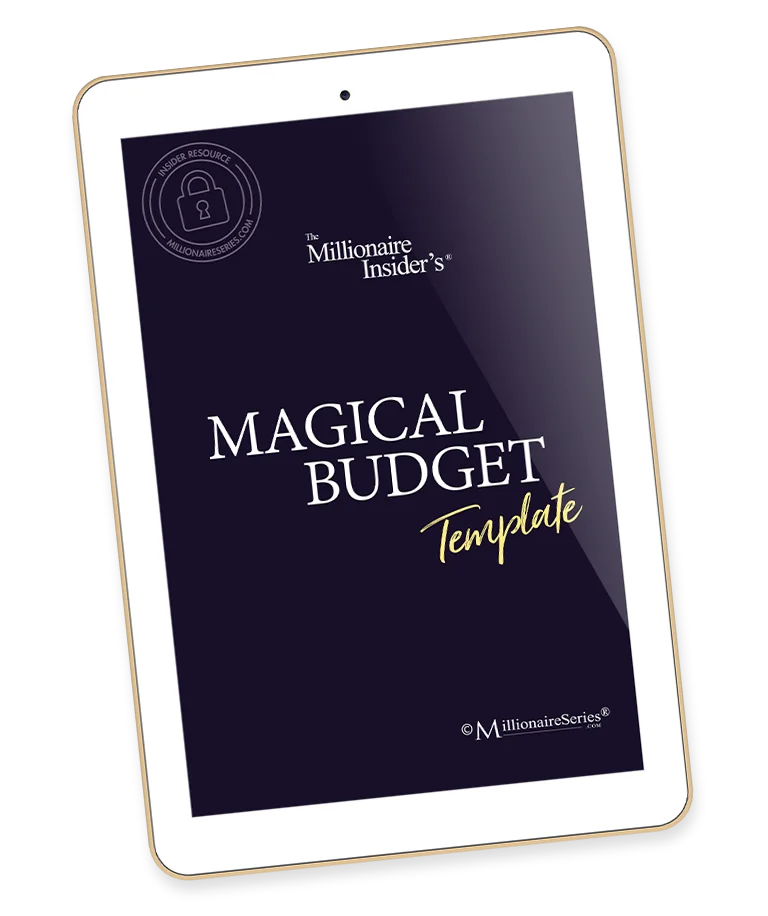Updated March 7th, 2024.
Discovering new ways to earn and save more money are critical components of a successful financial plan.
In 5 Easy Ways to Save Money, you will learn:
- Several of the best strategies I learned directly from millionaires
- How to make saving money easy and fun (No, it doesn’t have to feel like a diet!)
- What wealthy people do that most people don’t do
- Strategies for saving that you may not know exist
- How to maximize discounts and pay less like a wealthy person
Disclosure
All materials and intellectual property are copyrighted by MillionaireSeries.com®.
This information is for educational purposes only. It is not intended to replace any advisor or specialist or provide any investment, financial, tax, retirement, planning, or healthcare advice.
By reading this, you agree to hold MillionaireSeries.com® and its affiliates harmless for results achieved or not achieved.
Smart Ways to Save Money
Set your short and long-term savings goals.
The best time to start saving money is yesterday; the next best time is today.
So, instead of beating yourself up for what you haven’t done, focus your energy on starting a savings plan now. The money savings tips you will learn in this article are a great first step.
First, set clear savings goals. Decide why you want to accumulate money (like for a house or emergencies) and determine how much you need to save each month.
Next, make a budget. Track your income and expenses, and look for ways to reduce spending. Consider finding ways to make extra money, too.
Be consistent with your savings. Set up automatic transfers to your savings account and avoid unnecessary spending.
Remember, saving money takes time. Stay patient and keep working towards your goals. Starting now will set you on the right path to financial security.
While interest rates on savings accounts are typically low, you should always shop around to find the best option. Also, ask about linking your bank accounts to reduce fees or get a better interest rate.
Fund Your Emergency Savings and Retirement Accounts

The first savings goal to work toward should be to fund your emergency reserve. This will include six months or more of your monthly expenses.
First, determine how much money you can afford to invest each month. Then, automatically transfer that amount from your checking account to your savings account each month. If you haven’t funded your emergency fund, make that a priority.
Setting up a new savings or money market account to fund your emergency reserve is best.
Once you start building your savings, it is essential not to spend the money unless it is an emergency.
If you haven’t started saving for retirement, do so as soon as possible. Knowing how much money  you will need to retire comfortably is important.
you will need to retire comfortably is important.
It may be helpful to hire a financial advisor to help you determine how much money you need to save to meet your goal.
Automate your savings
One of the easiest ways to save money is to automate savings deposits. Online banking and budgeting apps have made this easier.
You can start by determining your monthly savings goal. Pick a date to deposit that amount into your savings account each month so you don’t have to think about it. Then, when you have extra cash or receive a bonus, you can deposit it separately into your savings account.
Reduce your bills
Another important step is to review where your money goes and then determine what you need and can afford. Some great questions to ask yourself include:
- Do you save money with Amazon Prime?
- Can your landscaping company come every other week instead of every week? (This can dramatically reduce your bill!)
- Can you reduce your car insurance?
- Should you refinance your mortgage? (Always check with a qualified advisor instead of someone getting paid to refinance your debt!)
If you need support, start here:

- Are there cheaper streaming services, and do I even need one?
- Can I start using LED light bulbs that are more energy efficient? And, as a result, save more money?
- Do I need to eat out multiple times per week?
- Can I take a shorter shower to reduce my water bill?
- If I take only cash to the grocery store, would I spend less money?
- Can I reduce my bi-monthly pedicure to once every three weeks?
- Can I find a cheaper cell phone plan?
Ask for discounts

In today’s episode, you will learn big savings tips, plus how to ask for discounts without feeling awkward. For example – can you pay cash and get a discount?
While it may be uncomfortable to ask for a discount, in this episode, I teach you how.
You will learn what to say with ease and without sounding cheap. Cash is the ace here, and most companies will gladly take it to avoid credit card fees.
If they don’t offer a discount for paying with cash, they may offer an interest-free payment plan.
Another option is to equalize your variable bills, such as your natural gas or electric bill.
Some companies (whose bills fluctuate during the year) allow you to set up fixed payments. For example, in colder climates, electricity bills are generally higher in the winter.
By equalizing your bill, you can pay a set amount each month. This makes budgeting easier.
Additional Tips
- Avoid paying interest when possible
- Set up a direct deposit and monitor your spending habits to see where you can save money
- Set savings goals and review them regularly
- Open a high-yield savings account
- Deposit tax refunds into your savings or investment account
- Consider using money-saving apps to manage your spending plan
- Identify your bigger pictures goals and how this will impact you and your families future
Click the image below to watch today’s episode, where you will learn:

- How to get a discount on your internet or cable bill.
- Ways to ask for discounts without feeling awkward and how to score a win-win for both parties.
- Learn how to save money by asking for a discount on your medical bill (This saved me $1,000!).
- What to ask before you have a medical procedure (This can reduce your medical expenses.).
- The exact question I asked that saved me over $700 and allowed me to stay within my budget. Click here to download The Magical Budget Template:
- What to say if the final invoice is more than you expected or what was quoted.
- How I saved over $6,500 simply by asking one question.
- The different ways to ask for a reduction in price.
- How I got my cell phone company to reimburse me for a $1,000 overcharge (It was not easy but worth the wait.).
- The most critical discovery I made about how millionaires think and save money.
- How to reduce recurring vendor fees (I saved over 35% per year on just one vendor and 75% with another vendor using this strategy.).
Additional Ways to Save Money

Remove money blocks
If you overspend, identifying and removing money blocks is a great place to begin saving money.
Money blocks are often developed early in life and can be so ingrained that we are unaware of them.
An inability to accumulate money or a tendency to overspend is a side-effect of a money block.
Pay off your debt
Paying off debt is both a fiscally responsible and a crucial step in achieving long-term financial freedom.
Debt, like credit cards or student loans, can burden your finances and well-being. Prioritizing paying off your debt reduces financial stress, lowers interest payments, and paves the way for financial success.
The first step in tackling your debt is to assess the full extent of what you owe. Gather all your financial statements, including credit card bills, loan statements, and other balances. Understanding your total debt load will help you create a realistic payment plan and set achievable goals.
Once you have a clear picture of your debt, it’s time to devise a strategy for paying it off. You can take several approaches, depending on your financial situation and personal preferences.
One common method is the debt snowball method, which focuses on paying off your smallest debts first while making minimum payments on larger debts.
As each smaller debt is paid off, you roll the amount you were paying on that debt into the next smallest debt, creating a snowball effect that accelerates your debt repayment.
Another approach is the debt avalanche method, where you first prioritize paying off debts with the highest interest rates. By tackling high-interest debt first, you can save money on interest payments over time and pay off your debt more efficiently. Whichever method you choose, the key is to stay consistent and committed to your repayment plan.
Reduce your grocery bill

In a recent survey, one family shared that their monthly grocery bill was less than $1,000! Other single people were only spending $300 monthly. One of their secrets is that they prepared most of their meals and rarely dined out.
One of the best strategies is to create a monthly food budget. Then, divide that amount by the number of weeks in the month (assuming you shop for groceries each month). When you shop for groceries, take that amount of cash with you and no more.
While this strategy requires paying attention to your purchase, it is amazing how much money you will save. Before you know it, overspending on your groceries will be a thing of the past.
Compare insurance rates
If you haven’t compared insurance rates on your car, home, or umbrella policy, prioritize this.
Many of our members and clients share that they have saved hundreds of dollars simply by comparing rates.
Stop buying to-go coffee

Do you really need that $5 latte from your favorite coffee shop each morning?
One of my friends and her husband spent $28 daily on specialty coffee drinks – over $9,500 annually!
Their justification was that it only cost $5 a drink (yet they bought four daily). When I shared the annual cost with them, they were shocked.
Say “yes” to free money
Most employers will match your retirement savings up to a certain amount.
For example, if your employer matches up to 6% of the amount you fund into your retirement account and you save that amount or more, you are receiving free money!
Sell the things that don’t bring you joy
Your home and closet (for my women friends) are likely a gold mine. Most of us have so many things we don’t need that could be sold to make money. Ways to sell off items include consignment stores, local online marketplaces, and even social media accounts (if you list online, be aware of your safety).
Resell other people’s stuff

Our community has a special trash collection days where we can throw away large items that don’t fit into the garbage can.
Sample of items discarded include:
- Furniture, such as tables, chairs, dressers, beds, desks, lamps
- Kids items, such as strollers, sports equipment, bicycles
- Building supplies, such as doors, frames, toilets, sinks
- Miscellaneous items, such as stoves, vacuums, weights, and much more
(Recently, I saw a vacuum valued at over $500. The next day, it was gone.)
Many items are in good condition, but people don’t want them or don’t have the time to take them to a charity store. Others obviously see their value as many items are taken before the city picks them up. These reclaimed items are likely fixed to be used or resold at little or no cost to the finder.
Conclusion: 5 Easy Ways to Save Money That Most People Don’t Know

Remember: The first step is to start saving money today. Begin by funding your emergency reserve, paying off your debt, and saving for retirement.
Also, review where you are currently spending money and determine what you can reduce or eliminate from your monthly expenses. You will be amazed at what you save!
While it can seem overwhelming to think about the task ahead, creating a plan, finding support from qualified people, and executing, the task can become more manageable.
Many people share that finding a supportive friend, advisor, or coach made the process much easier.
It takes an average of 66 days to change a habit (including overspending), but living a financially free life you love is priceless.
Click here to access today’s episode: Ways to Save More Money.


